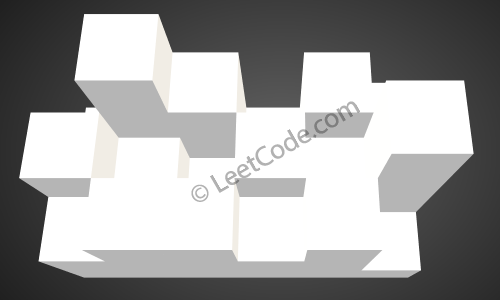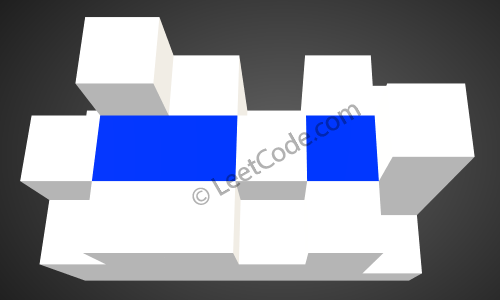Given an m x n matrix of positive integers representing the height of each unit cell in a 2D elevation map, compute the volume of water it is able to trap after raining. Note: Both m and n are less than 110. The height of each unit cell is greater than 0 and is less than 20,000. Example: Given the following 3x6 height map: [ [1,4,3,1,3,2], [3,2,1,3,2,4], [2,3,3,2,3,1] ] Return 4.

The above image represents the elevation map [[1,4,3,1,3,2],[3,2,1,3,2,4],[2,3,3,2,3,1]] before the rain.

After the rain, water are trapped between the blocks. The total volume of water trapped is 4.
Refer to https://discuss.leetcode.com/topic/60418/java-solution-using-priorityqueue/2
这里有具体的例子:http://www.cnblogs.com/grandyang/p/5928987.html
Analysis, 根据木桶原理,先找外围最矮的bar,里边如果有bar比它还矮,一定能存水(因为四周所有的bar都比它高)
注意还可能存更多的水,因为往里面,很可能cell高度变化。所以要把BFS中间遇到的高的bar都存进queue,随着水平面提升,提升到这些bar的高度,看能不能有凹槽存更多的水
44-45行逻辑就是
if (height[row][col] < cur) {
res += cur.height- height[row][col];
queue.offer(new Cell(row, col, cur.height));
}
else {
queue.offer(new Cell(row, col, height[row][col]));
}
1 public class Solution { 2 public class Cell { 3 int row; 4 int col; 5 int height; 6 public Cell(int x, int y, int val) { 7 this.row = x; 8 this.col = y; 9 this.height = val; 10 } 11 } 12 13 public int trapRainWater(int[][] heightMap) { 14 if (heightMap==null || heightMap.length<=2 || heightMap[0].length<=2) return 0; 15 int m = heightMap.length; 16 int n = heightMap[0].length; 17 int res = 0; 18 PriorityQueue<Cell> queue = new PriorityQueue<Cell>(1, new Comparator<Cell>() { 19 public int compare(Cell c1, Cell c2) { 20 return c1.height - c2.height; 21 } 22 }); 23 HashSet<Integer> visited = new HashSet<Integer>(); 24 for (int i=0; i<m; i++) { 25 queue.offer(new Cell(i, 0, heightMap[i][0])); 26 queue.offer(new Cell(i, n-1, heightMap[i][n-1])); 27 visited.add(i*n+0); 28 visited.add(i*n+n-1); 29 } 30 for (int j=0; j<n; j++) { 31 queue.offer(new Cell(0, j, heightMap[0][j])); 32 queue.offer(new Cell(m-1, j, heightMap[m-1][j])); 33 visited.add(0*n+j); 34 visited.add((m-1)*n+j); 35 } 36 int[][] directions = new int[][]{{-1, 0}, {1, 0}, {0, 1}, {0, -1}}; 37 while (!queue.isEmpty()) { 38 Cell cur = queue.poll(); 39 for (int[] dir : directions) { 40 int row = cur.row + dir[0]; 41 int col = cur.col + dir[1]; 42 if (row>=0 && row<m && col>=0 && col<n && !visited.contains(row*n+col)) { 43 visited.add(row*n+col); 44 res += Math.max(0, cur.height - heightMap[row][col]); 45 queue.offer(new Cell(row, col, Math.max(cur.height, heightMap[row][col]))); 46 } 47 } 48 } 49 return res; 50 } 51 }